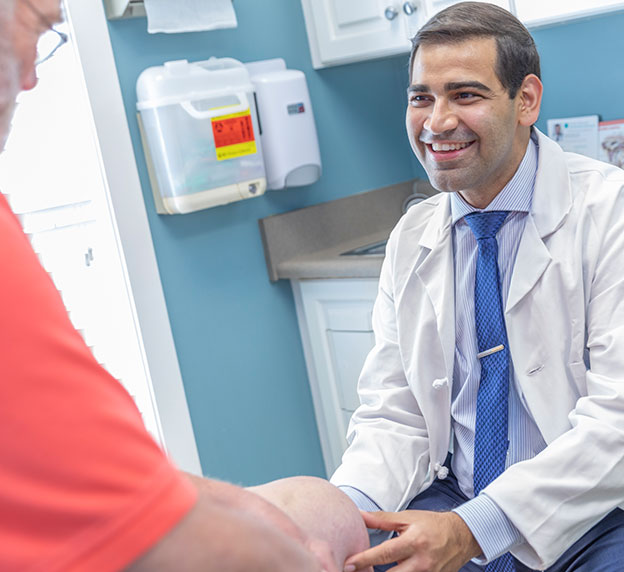
If you have knee pain, you know the limitations it can have on your life and daily activities — you’ve likely already discussed total joint replacement with your physician. But how do you know when to undergo surgery, and what can you expect after knee replacement surgery?
When Should I Have Knee Replacement Surgery?
For local realtor Dave Collins, 70, the pain from simple activities, such as walking downtown streets over cobblestone or up and down stairs, became unbearable.
“I wanted to be able to go for walks, go for hikes and ride my bike without having to come home and put ice on my knee,” says Collins, who would soon have both knees replaced at Beaufort Memorial within 90 days of one another.
Total knee replacement replaces the weight-bearing surfaces of the knee joint with artificial components, or a prosthesis. The timing of knee replacement surgery depends on a few factors, including:
- The level of damage to your cartilage and knee joint
- The severity of your knee pain and how much it limits your daily activities
- Your overall health, strength and range of motion
“The decision about when to have knee replacement should be shared between you and your orthopedic surgeon,” says Dr. Vandit Sardana, a board-certified, fellowship-trained orthopedic surgeon at Beaufort Memorial Orthopaedic Specialists. “If the damage isn’t extensive, we generally recommend nonsurgical joint pain treatments, such as steroid injections and physical therapy. When surgery is necessary, we’ll plan your procedure around your age and health to achieve the maximum benefit of your new artificial knee joint. Together, we set expectations about when to have surgery, what to expect afterward and what recovery will look like.”
Read More: From OR to RV: Enjoying Life After Knee Replacement
Understanding the Process for Total Joint Replacement
You’ll likely have questions if you’re facing joint replacement surgery. How quickly will I be able to return to walking? What will my pain be like after surgery? At the Beaufort Memorial Joint Replacement Center, our orthopedic surgeons and physical therapists provide all the answers in a setting focused on wellness.
Through an initial seminar, you’ll learn more about the conditions that cause pain in joints, treatment options including conservative and minimally invasive surgery, and specifics about preparation for and recovery from total joint replacement. Beaufort Memorial specialists emphasize the importance of setting realistic expectations about life after total joint replacement. To navigate the process, patients have the support of a total joint coordinator throughout the treatment process.
“Total knee replacement can relieve significant pain from arthritis that limits a person’s life,” Dr. Sardana says. “That said, it won’t necessarily enable you to do high-impact or other activities that you weren’t able to do before surgery. You may also notice stiffness for a few weeks after surgery, one common problem people report after a knee replacement. But working with your surgeon and therapy team helps you overcome those issues so you can get back to a more active life.”
Collins returned home the same day after both knee replacement surgeries. He credits his health and fitness and that he was returning home to his wife, who is a nurse at Beaufort Memorial.
Since the surgeries, Collins has been walking regularly, lifting weights and kayaking. He’s not running, but he rides his bike several miles a day with no pain.
“I actually feel like I’ve got a whole new beginning,” Collins says. “I can’t say enough about what it’s done. Suddenly, you’re able to do things you couldn’t do before. You don’t think twice about it.”
Total joint replacement can be a life-changing procedure for many individuals. It’s best to consider your quality of life, overall physical ability and impact of pain, and discuss the options for relief with an orthopedic specialist.
Specialized Care for Joint Replacement
The specialized team of physical therapists and orthopedists at the Joint Replacement Center guide patients through in-depth education about what to expect before, during and after total joint replacement, including conservative treatment options prior to surgery, potential complications, walking after surgery, expectations about physical activity as you heal, returning to work and more.
Thanks to our advanced techniques, many patients can go home the same day of surgery, eliminating the need to stay in the hospital for more than a day, and begin their rehabilitation process soon afterward.
Read More: Finessing Knee Replacements With a Robotic Arm
Here are more details of what to expect after a total knee replacement:
- Physical therapy begins before you leave the hospital. You’ll learn exercises that help you regain strength in your joint and surrounding muscles that you may not have used in a while. Your therapist will also give you tips to help manage any lingering stiffness you may feel.
- You’ll start walking almost immediately after surgery using assistive devices under the guidance and support of a physical therapist. Your “first mate,” or after-surgery support person, will accompany you to physical therapy and patient education sessions.
- You’ll build skills to learn how to move and maneuver through functional activities as you heal, and you’ll transition to home-based or outpatient physical therapy to continue recovery at home.
If you’ve been living with persistent, debilitating knee pain from arthritis, a total knee replacement may provide a path toward relief. Talk with your orthopedic specialist to learn more about what to expect and how best to prepare for a knee replacement.
Ready to leave knee pain behind? Register for an upcoming “Solving Hip and Knee Pain” seminar to learn more about knee replacement options at Beaufort Memorial.

